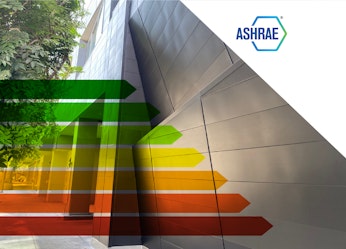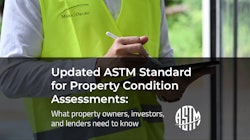

M|O Perspectives
Check back here for our thoughts on the latest developments in our industry.
The Vital Role of ASHRAE Energy Audits in Sustainable Building Management
Oct 10, 2023
In an era where carbon emissions reduction and energy efficiency are paramount concerns for building owners, operators, and occupants, the American Society of Heating, Refrigerating and Air-Conditioning Engineers (ASHRAE) energy audits have emerged as a vital tool in achieving sustainability goals. These audits provide a structured approach to assessing and improving energy efficiency in buildings and systems. Whether you are driven by carbon emissions reductions, saving money during operations, or both, energy audits are a simple, low-cost strategy that can assist you in pursuit of your most critical goals.
ASHRAE, a globally recognized organization in HVAC&R (Heating, Ventilation, Air Conditioning, and Refrigeration) systems, has developed comprehensive standards and guidelines for energy audits. These audits aim to assess a building's energy performance, identify areas for improvement, and recommend energy-saving measures. ASHRAE has established three levels of energy audits that vary in degree of purpose and level of detail.
Level I Audit - Walk-Through Assessment: This level involves assessing the building energy costs and efficiency by analyzing energy bills and briefly surveying the building while accompanied by the building operator. Level I analysis identifies and provides a savings and cost analysis of low-cost/no-cost measures. It also lists potential capital improvements that merit further consideration, along with an initial judgment of potential costs and savings.
Level II Audit - Energy Survey and Analysis: This includes a more detailed building survey and energy analysis. A breakdown of building energy use is provided. A Level II analysis identifies and provides the cost and savings analysis of practical measures that meet the owner's constraints and economic criteria, along with discussions of effects on operation and maintenance procedures. A Level II audit lists potential capital-intensive improvements that require more thorough data collection and analysis, along with an initial judgment of potential costs and savings.
Level III Audit - Detailed Analysis of Capital-Intensive Modifications: This level of analysis focuses on potential capital-intensive projects identified during previous studies, and it involves more detailed field data gathering and engineering analysis. It provides detailed project cost and savings information with a level of confidence high enough for major capital investment decisions.
The wide-ranging benefits of ASHRAE energy audits
ASHRAE energy audits provide broad benefits to your building, operations, and financial performance. This is especially true for the older building stock that may have been built prior to more efficient performance-based requirements being in place. These include:
- Cost Savings: Energy audits can lead to significant cost savings over time. By identifying and addressing energy inefficiencies, building owners can reduce utility bills and operational expenses. In our experience, often the savings can outweigh the initial audit costs with a lasting effect.
- Regulatory Compliance: Many local jurisdictions currently have or are in the process of establishing energy efficiency regulations and requirements, including requirements for periodic energy audits in some jurisdictions, such as with Local Law 97 in New York City. ASHRAE energy audits help building owners ensure they comply with these standards and avoid potential fines or penalties.
- Enhanced Property Value: Energy-efficient buildings are more attractive to tenants and investors. Higher energy performance translates to increased property value and a competitive edge in the real estate market.
- Environmental Impact: One of the most critical reasons to perform ASHRAE energy audits is to identify strategies to reduce energy consumption, translating to lower greenhouse gas emissions.
- Future-proofing: As energy costs continue to rise and environmental concerns grow, energy-efficient buildings are better equipped to weather these challenges. ASHRAE audits help future-proof properties against changing energy, climate, and regulatory landscapes.
- Improved Comfort: Energy audits often result in improved occupant comfort. By optimizing HVAC systems, temperature control, and ventilation, buildings can become more pleasant places to work and live in.
In the pursuit of a sustainable and energy-efficient future, ASHRAE energy audits are a crucial tool. They provide building owners and other stakeholders with valuable insights into their facility’s energy consumption patterns and offer actionable recommendations for improvement. By investing in energy audits, individuals and organizations can simultaneously reduce costs, minimize their environmental footprint, and contribute to a more sustainable built environment while ensuring their buildings will meet potential jurisdictional regulatory requirements.
At Marx|Okubo, we are committed to this future as well and are very experienced in performing these audits and advising accordingly. If you want to learn more about sustainable building management or how an energy audit may benefit your building or portfolio, please reach out to Robert Phinney or Courtney Wladyka, Co-directors of ESG.

What we do.
- Owner's Representation
- Property Condition Assessment
- Project Management
- Constructability Reviews
- Repair | Reconstruction
- Facility Condition Assessment
- Construction Loan Monitoring
- Accessibility
- Building Enclosure
- Fire | Life Safety
- Mechanical | Electrical | Plumbing
- ESG | Sustainability & Resiliency
- Structural Engineering
- ASAP® - Automated Structure Alert Program
Marx|Okubo is a national architecture/engineering/construction consulting firm that works with real estate owners, investors and lenders—at every point of the property lifecycle—to evaluate their building projects, solve complex challenges and implement tailored solutions. We help clients understand their projects’ complexities, so they can make more informed decisions and, ultimately, mitigate their risk.




